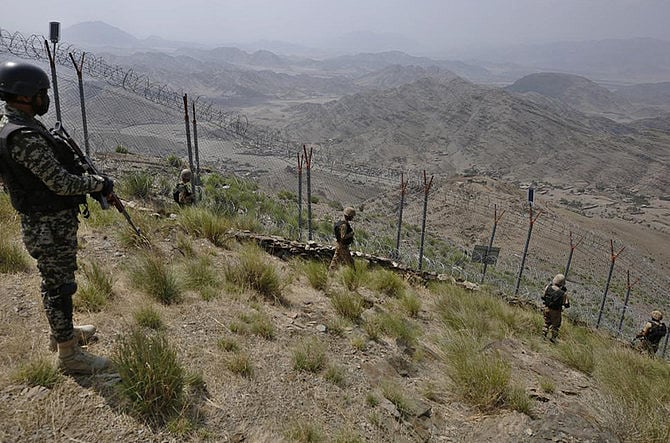Dubai: Heavy fighting broke out along the Pakistan—Afghanistan border over the weekend, with both countries accusing each other of initiating hostilities in one of the most serious escalations since the Taliban’s return to power in 2021.
According to Pakistan’s state media, security forces launched retaliatory operations after “unprovoked firing” by Afghan forces at several locations along the border, including Angoor Adda, Bajaur, Kurram, Dir, Chitral, and Bahram Chah.
Pakistan military reportedly used artillery, tanks, and drones to target Afghan positions, saying it captured 19 Afghan border posts from where the attacks were launched.
Pakistan’ state broadcaster PTV aired footage showing border posts in flames and Afghan soldiers allegedly surrendering in Kurram. Pakistan also claimed to have destroyed several Taliban installations, including the Manojba battalion headquarters and Kharchar Fort.
The clashes came days after Afghanistan accused Pakistan of carrying out air strikes in Kabul and eastern provinces, a charge Islamabad has not confirmed or denied.
What Pakistan says
Islamabad has described the border attacks as unprovoked aggression by Afghan forces. Interior Minister Mohsin Naqvi said the “firing on civilian populations” was a “blatant violation of international laws,” adding that Pakistan’s armed forces gave a “prompt and effective response.”
President Asif Ali Zardari and Prime Minister Shehbaz Sharif both condemned the “provocations,” stressing that Pakistan will make “no compromise” on national defence.
President Zardari said United Nations reports had “proved” that terrorist attacks in Pakistan were being carried out from Afghan soil.
He urged the Taliban administration to take “concrete and verifiable action” against militants operating from Afghan territory, calling cross-border terrorism “the greatest threat to regional stability.”
Islamabad maintains that the Tehreek-e-Taliban Pakistan (TTP) — a banned militant group responsible for numerous attacks inside Pakistan — continues to enjoy safe haven in Afghanistan.
What Afghanistan says
The Taliban government in Kabul accuses Pakistan of violating Afghan airspace and launching deadly air strikes earlier in the week, including one near the capital and another in Paktika province. Afghan officials say the latest clashes were “retaliatory operations” against repeated Pakistani incursions.
Zabihullah Mujahid, spokesperson for the Taliban government, claimed that Afghan forces captured three Pakistani border posts and inflicted heavy casualties, including 58 Pakistani soldiers killed and 30 wounded. He warned Pakistan “to desist from using force,” saying such actions would have “negative consequences.”
Mujahid also alleged that “certain elements within the Pakistani establishment want to destabilise Afghanistan.”
The Afghan Ministry of Defence said its operations ended at midnight but vowed to respond “firmly” if Pakistan violated Afghan territory again. Kabul denies sheltering the TTP and insists it does not allow Afghan soil to be used for attacks against neighbouring countries.
Regional and international reaction
Iran, Saudi Arabia, and Qatar have all called for restraint and dialogue, urging both countries to de-escalate tensions.
Saudi Arabia said it was following the situation with “concern” and called on both sides to “embrace dialogue and wisdom.” Qatar reiterated its support for regional stability and called for “diplomacy over escalation.”
Background: Long-simmering border tensions
Tensions between Pakistan and Afghanistan have surged in recent months over a series of deadly cross-border attacks that Islamabad blames on militants operating from Afghan territory.
Pakistan says its patience is wearing thin, pointing to repeated attacks on its security forces in border provinces such as Khyber Pakhtunkhwa and Balochistan.
The TTP, which Pakistan regards as an ally of the Afghan Taliban, has claimed several deadly assaults inside Pakistan, including those that killed over 20 security officials this week.
Since the Taliban takeover of Kabul in August 2021, Pakistan had hoped for improved border security and cooperation. Instead, relations have deteriorated, with both sides accusing the other of violating sovereignty and harbouring militants.
The closure of the Torkham border crossing on Sunday underscored the gravity of the situation, disrupting trade and travel between the two neighbours.
Sign up for the Daily Briefing
Get the latest news and updates straight to your inbox
Network Links
GN StoreDownload our app
© Al Nisr Publishing LLC 2026. All rights reserved.

